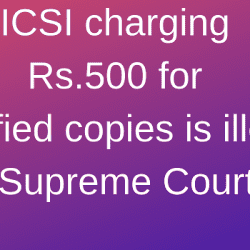ICSI (also ICAI) charging Rs. 500 for certified copies is illegal : Supreme Court

ICSI (also ICAI) Charging Rs. 500 for certified copies is illegal
As per a recent judgment of the Supreme Court in ICSI v. Paras Jain [Civil Appeal No. 5665/2014, dated 11-4-2019], the High Court held that educational Bodies cannot charge more than RTI fee for providing certified copies to students. The RTI Fee as per RTI Rules, 2012 read with RTI Act, 2005 is Rs. 10 fixed per application + Rs. 2 per page. Hence, charging of Rs. 500 or Rs. 1000 per copy is illegal.
Example: Suppose, a student has written 20 pages. Hence, he can be asked to pay only Rs. 50 (Rs. 10 for application + Rs. 2 per page × 20 pages = Rs. 50).
Download Copy of Judgment
IN THE SUPREME COURT OF INDIA
CIVIL APPEAL NO. 5665/2014
INSTITUTE OF COMPANIES SECRETARIES OF INDIA (ICSI) v. PARAS JAI
ORDER
1. This appeal is directed against the order dated 22.04.2014 of the Delhi High Court wherein, while allowing the Letters Patent Appeal, filed by the respondent herein, it set aside Guideline No.3 notified by the statutory council of appellant–Institute of Companies Secretaries of India (ICSI) and directed it to charge fee prescribed as per Rule 4 of the Right to Information (Regulation of Fee and Cost) Rules, 2005.
2. The factual matrix of the case is that the respondent appeared in the final examination for Company Secretary (ICSI) conducted by the Appellant in December 2012. On being unsuccessful in qualifying the examination, the respondent made an application under the Right to Information Act for inspection of his answer sheets and subsequently, sought certified copies of the same from the appellant. The appellant thereafter has demanded Rs.500/per answer sheet payable for the supply of certified copies of answer book(s) and Rs.450/per answer book for providing inspection thereof respectively as per Guideline No.3 notified by the statutory council of the appellant. It is to be noted that the respondent obtained the said information under the Right to Information Act, 2005.
3. Being aggrieved by the demand made by the appellant, the respondent preferred a Writ Petition before the Delhi High Court wherein the Learned Single Judge dismissed the petition. A Letters Patent Appeal was thereafter preferred by the respondent wherein, the Division Bench quashed Guideline No.3 notified by the appellant and held that the appellant can charge only the prescribed fee under Rule 4, The Right to Information (Regulation of Fees and Cost) Rules, 2005.
4. The short issue before us is when the answer scripts of appellant’s examination is sought whether the fee prescribed under Rule 4 of the Right to Information (Regulation of Fee and Cost) Rules, 2005 payable or that under Guideline No. 3 of the Guideline, Rules and Procedures for Providing Inspection and/or Supply of Certified Copies of Answer Book(s) to Students, framed by the Examination Committee of appellant’s statutory Council at its 148th Meeting held on 14.08.2013.
5. The learned counsel appearing on behalf of the appellant argued that it is undisputed that the Right to Information Act, 2005 is applicable to the appellant. However, in light of specific guidelines formulated under the (ICSI) Company Secretaries Act, 1980, the same should be applicable and not that which is provided under the Right to Information Act. He further contends that owing to quashing of Guideline No. 3 by the Division Bench of Delhi High Court, the appellant cannot collect any amount of fee except the one prescribed under Rule 4, The Right to Information (Regulation of Fees and Cost) Rules, 2005 which adds to financial strain on the appellant.
6. On the other hand, the learned counsel appearing on behalf of the respondent submitted that any candidate who seeks his answer scripts under Right to Information Act, 2005 can only be charged under Rule 4, The Right to Information (Regulation of Fees and Cost) Rules, 2005.
Further, the learned counsel submits that the candidates must have a choice to seek the answer scripts either by the avenue under Right to Information Act or under the Guidelines of the appellant framed by the examination committee of statutory Council under the (ICSI) Company Secretaries Act, 1980.
7. Having heard the learned counsels appearing for the parties and we have also meticulously perused the record.
8. The appellant is governed by the provisions of the Company Secretaries Act, 1980 (ICSI) and under Sections 15, 15A and 17, the Examination Committee of the statutory Council has framed Guideline No. 3 providing an avenue to the candidates to either inspect their answer scripts or seek certified copies of the same on payment of the stipulated fees. Guideline no.3 stipulates the payment of Rs. 500 for obtaining certified copies and Rs. 450 for seeking inspection of the same.
“3. Fee of ₹500 per subject/answer books payable for the supply of certified copies of answer book (s) and ₹450 per answer book for providing inspection thereof respectively. The fee shall be paid through Demand Draft drawn in favor of “The Institute of Company Secretaries of India”, payable at New Delhi.”
9. On the contrary, Rule 4, The Right to Information (Regulation of Fees and Cost) Rules, 2005 stipulates,
“4. For providing the information under subsection (1) of section 7, the fee shall be charged by way of cash against proper receipt or by demand draft or bankers cheque or Indian Postal Order payable to the Accounts Officer of the public authority at the following rates:—
(a ) rupees two for each page (in A4 or A3 size paper) created or copied;
(b) actual charge or cost price of a copy in larger size paper;
(c) actual cost or price for samples or models; and
(d) for inspection of records, no fee for the first hour; and a fee of rupees five for each subsequent hour (or fraction thereof).”
(emphasis supplied)
10. Thus it is clear that the avenue for seeking certified copies as well as inspection is provided both in the Right to Information Act as well as the statutory guidelines of the appellant.
11. We are cognizant of the fact that guidelines of the appellant, framed by its statutory council, are to govern the modalities of its day to day concerns and to effectuate smooth functioning of its responsibilities under the Company Secretaries Act, 1980. The guidelines of the appellant may provide for much more than what is provided under the Right to Information Act, such as reevaluation, re-totaling of answer scripts.
12. Be that as it may, Guideline no.3 of the appellant does not take away from Rule 4, The Right to Information (Regulation of Fees and Cost) Rules, 2005 which also entitles the candidates to seek inspection and certified copies of their answer scripts. In our opinion, the existence of these two avenues is not mutually exclusive and it is up to the candidate to choose either of the routes. Thus, if a candidate seeks information under the provisions of the Right to Information, then payment has to be sought under the Rules therein, however, if the information is sought under the Guidelines of the appellant, then the appellant is at liberty to charge the candidates as per its guidelines.
13. The appellant has submitted that the Division Bench of Delhi High Court erred in quashing Guideline no.3 which is affecting not only the appellant but also the candidates. Taking into consideration the fact that such quashing was done despite no prayer being made to that effect on behest of the respondent, we hold that quashing of Guideline No.3 was unwarranted. It is to this limited extent that we allow the appeal and set aside the impugned order of Division Bench of Delhi High Court whereby it quashed Guideline No.3.
14. Learned counsel appearing for the appellant further submitted that owing to the nominal fee fixed under the Right to Information Act, the dissemination of information by the appellant has become financially burdensome and he wants to make a representation to the Government for enhancing the fee prescribed under the Right to Information Act. It is left open to him to make such a representation.
15. The appeal is disposed of in the aforestated terms and pending applications, if any, shall also stand disposed of.
(N.V.RAMANA)
(S. ABDUL NAZEER)
NEW DELHI;
APRIL 11, 2019.
As per a recent judgment of the Rajasthan High Court in RAJAK KHAN v. JAI NARAYAN VYAS UNIVERSITY [2017 (355) E.L.T. 25 (Raj.)], the High Court held that educational Bodies cannot charge more than RTI fee for providing certified copies to students. The RTI Fee as per RTI Rules, 2012 read with RTI Act, 2005 is Rs. 10 fixed per application + Rs. 2 per page. Hence, charging of Rs. 500 or Rs. 1000 per copy is illegal.
The judgment is reproduced below :
2017 (355) E.L.T. 25 (Raj.)
IN THE HIGH COURT OF JUDICATURE FOR RAJASTHAN AT JODHPUR
Pradeep Nandrajog, C.J. and Dr. Pushpendra Singh Bhati, J.
RAJAK KHAN Versus JAI NARAIAN VYAS UNIVERSITY
D.B. Civil Writ Petition No. 10724 of 2015, decided on 10-4-2017
[Order]. – The issue raised in this writ petition concerning respondent charging a non-refundable fee of Rs. 1,000/- per answer book for issuing certified copy thereof, has been decided by a Division Bench of this Court on December 21, 2012, in D.B. Civil Writ Petition No. 12471/2012 with reference to Maharaja Ganga Singh University. In the instant writ petition, the University is Jai Narain Vyas University.
2. Following the law declared by the Division Bench, we quash the condition put by the respondent-University that those who desire inspection or a copy of the answer book would have to pay a fee of ` 1,000/-. The fee payable would be as per the Right to Information Act, 2005.
3. The controversy reflected in the order dated January 5, 2017 passed by the Division Bench of this Court cannot be resolved at this stage for the reason, the Competent Authority as defined under Section 2(e) of the Right to Information Act, 2005 which is competent to notify the Rules in terms of the power under Section 28 of the Right to Information Act, 2005, has not taken any action. The decision of the University to constitute a Committee to recommend promulgated Rules for amendment of the existing Rules is pending before the Committee as on date and unless a notification contemplated by Section 27 of the Right to Information Act, 2005 is issued this Court cannot go into the said issue.
4. The petition is disposed of.
5. No costs.
As per Rule 4 of the RTI Rules, 2012, the fee can be —
4. Fees for providing information.—Fee for providing information under sub-section (4) of Section 4 and sub-sections (1) and (5) of Section 7 of the Act shall be charged at the following rates, namely:—
(a) rupees two for each page in A-3 or smaller size paper;
(b) actual cost or price of a photocopy in large size paper;
(c) actual cost or price for samples or models;
(d) rupees fifty per diskette or floppy;
(e) price fixed for a publication or rupees two per page of photocopy for extracts from the publication;
(f) No fee for inspection of records for the first hour of inspection and a fee of rupees 5 for each subsequent hour or fraction thereof; and
(g) so much of postal charge involved in the supply of information that exceeds fifty rupees.
Article Credit:- vineetsodhani
Tags: icai, ICSI